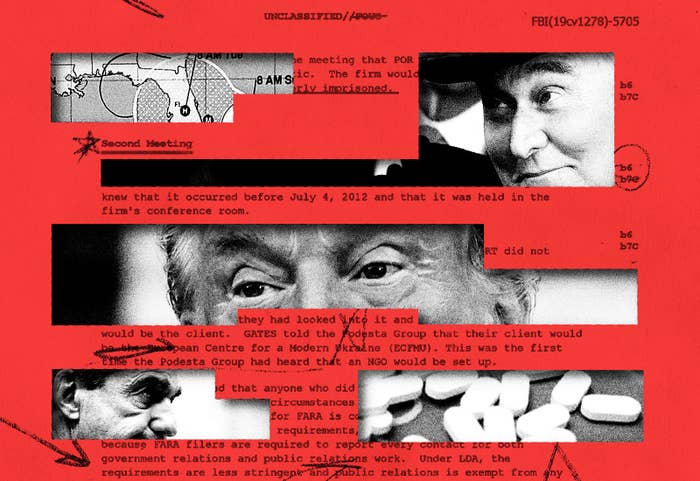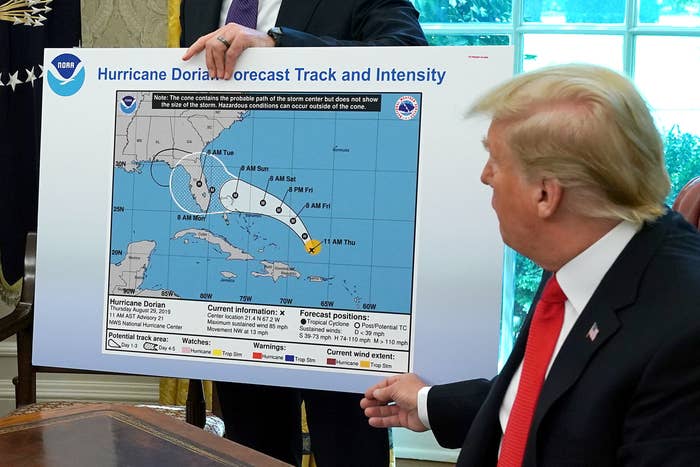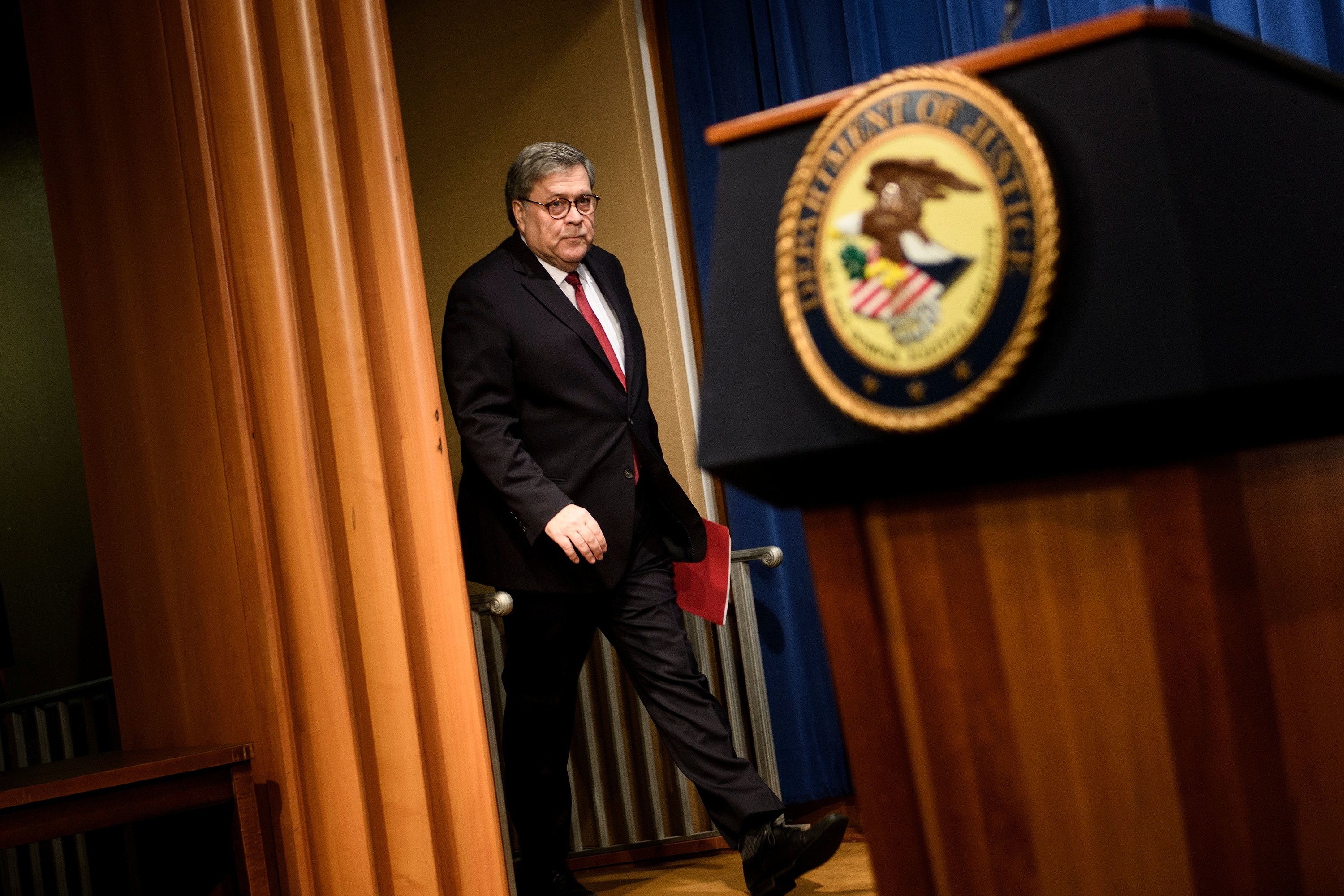
A new analysis shows that BuzzFeed News led the way in the fight for public records during the tumultuous years of the Trump administration.
Since Donald Trump's first day in office, our newsroom has filed more lawsuits based on the Freedom of Information Act — 58 cases — than any other news organization in the United States, according to a forthcoming report from the Transactional Records Access Clearinghouse (TRAC), a data research organization out of Syracuse University, which analyzed 20 years of federal public records lawsuits by news organizations and reporters.
The report also identified one of the authors of this article, Jason Leopold, as "the most active individual FOIA litigator in the United States today" with 69 lawsuits filed against the federal government since 2012.
Among the other news organizations cited for aggressive actions in court were the New York Times and the Center for Public Integrity.
BuzzFeed News’ yearslong effort to hold the Trump administration accountable culminated in 2020 with an aggressive legal campaign that pried loose tens of thousands of pages of government documents and, more important, dozens of government secrets. During a year unlike any other, the records we obtained revealed what has taken place behind the scenes at a range of government agencies handling the administration's response to the coronavirus pandemic, the Black Lives Matter protests, the Russia investigation, immigration policies, and other contentious issues.
But in some ways 2020 was a typical year for BuzzFeed News, which has made a practice of challenging government officials trying to withhold public documents. The battle against recalcitrant public officials required not only the work of our own lawyers but also enlisting outside counsel, including attorneys Jeffrey Light, Matt Topic, Josh Burday, Rachel Eun, Merrick Wayne, Blake Bunting, Beki Sonin and Josh Loevy of Loevy & Loevy, and Katie Townsend and Jen Nelson at the Reporters Committee for the Freedom of the Press.
“The Supreme Court and Congress have repeatedly acknowledged that transparency is fundamental to democracy, yet agencies routinely violate their FOIA obligations,” said Topic, whose Chicago firm has successfully represented BuzzFeed News in a number of public records cases. “BuzzFeed News has become a leader in holding agencies accountable."
We started off the year publishing some of the most important and highly sought-after documents from former special counsel Robert Mueller’s investigation: summaries of FBI interviews with key White House officials. The documents, known as 302s, have been released to BuzzFeed News and CNN, which joined in our suit, on a monthly basis since November 2019, and they reveal new details about Trump, Russia, and the 2016 election found in the hundreds of interviews conducted by Mueller's team.
In February, BuzzFeed News secured more than 1,000 pages of emails from the National Weather Service and NOAA related to Trump’s "doctored" map of Hurricane Dorian — dubbed #SharpieGate — and the panic, outrage, and internal revolt it triggered among top officials at those agencies.
That month we also filed a lawsuit against the Justice Department for documents related to then–attorney general Bill Barr's intervention in the criminal cases of Trump's former national security adviser Michael Flynn and political consultant Roger Stone. Both were convicted of crimes in connection with Mueller's investigation. But Barr overruled his own prosecutors and stepped in to seek a reduced sentence for Stone, and the Justice Department abandoned the Flynn case altogether. Emails we obtained in response to this lawsuit brought to light the behind-the-scenes drama between the lead prosecutor in the Stone case, who asked to be removed because of Barr’s decision, and his supervisor, who refused to let him step away.
On paper, the FOIA law is clear and calls for expedient action: The government has 20 days to decide whether to disclose the records. But government agencies use a variety of methods to thwart the law — from obscure loopholes to plain old delays — so it can be almost impossible to get documents without a concerted fight.
The federal response to records requests only got worse during last year’s coronavirus outbreak. Some agencies used the pandemic to justify cutting off responses altogether and to abruptly halt the processing of FOIA requests.

BuzzFeed News fought back, arguing that government transparency is critical, particularly in times of public emergency. We filed lawsuits against the Food and Drug Administration, the National Institutes of Health, the Department of Health and Human Services, the Centers for Disease Control and Prevention, and the Department of Homeland Security.
Within three months, our cases bore fruit. We obtained documents that show the FDA authorized two malaria drugs boosted by Trump to treat COVID-19 based on threadbare evidence. The FDA documents outline what data the agency used to make the hot-button decision to allow widespread use of the drugs and raised serious questions about shoddy practices at overseas factories that manufactured and donated the drugs for use in American hospitals.
We continued to chip away at the secrecy behind the government's response to the outbreak, and in May we received documents that reveal how deeply involved the Federal Emergency Management Agency was in the government's bungled response to the pandemic, despite the agency's denials.
When the country erupted in protest after a Minneapolis police officer killed George Floyd on May 25, the federal government scrambled to respond, dispatching federal law enforcement agencies in a sweeping effort to police the demonstrations from coast to coast. BuzzFeed News swiftly filed FOIA requests with the Department of Homeland Security and other agencies and, weeks later, sued the government for records. In August, DHS turned over hundreds of pages of documents that show how agents monitored protesters’ social media for intelligence and then braced for battle.
One of the Trump administration's most enduring controversies has been its immigration policies, which have resulted in the separation of migrant parents and their children as well as dozens of deaths in detention facilities. To better understand what happened, BuzzFeed News filed a lawsuit against Immigration and Customs Enforcement and DHS. We obtained thousands of pages of documents, and in October we published our findings, which included that a woman with AIDS died after she was not given lifesaving antiretroviral drugs and that three detainees killed themselves even though they were supposed to have been under close observation for mental health concerns.
The documents tell the story of how ICE has in some instances failed to provide adequate care to detainees, some of whom are locked up for months or years before their immigration cases are resolved. Some internal emails show that ICE’s own investigators raised serious concerns about the agency’s care of the people it detains, with an employee describing the treatment leading up to one death as “a bit scary.”
Also last year, we used documents obtained through FOIA lawsuits against the Treasury and Justice Departments to inform our groundbreaking FinCEN Files investigation, published in September. The litigation rankled HSBC, one of the world’s largest banks. A secret report we sought about failures in HSBC’s anti–money laundering efforts led the bank to take the unusual step of intervening in our lawsuit. It wrote a four-page letter to the Justice Department asking that it refrain from releasing the report to BuzzFeed News. That case is ongoing.
Our transparency work has not just been limited to securing records through the Freedom of Information Act. We were handed a major victory in July that likely will benefit the public for years to come. The US Court of Appeals for the DC Circuit reversed a district court decision and ruled in favor of Leopold and the Reporters Committee in their yearslong effort to unseal electronic surveillance records when investigations have been closed. The court decided the “public’s right of access to judicial records is a fundamental element of the rule of law.”
The Mueller report, Russia’s election interference, and Ukrainian dealings that led to impeachment dominated much of Trump’s term in office; they also were targets of BuzzFeed News’ legal efforts.
Our FOIA work generated national headlines in March when US District Court Judge Reggie Walton, who was handling our lawsuit to unredact Mueller's 448-page report, issued a scathing opinion that questioned whether Barr intended to “create a one-sided narrative” in an effort to “influence public discourse” about the report's conclusions prior to its release in April 2019.

In June, the Justice Department was forced to remove vast swaths of black ink from the Mueller report in response to lawsuits by BuzzFeed News and an advocacy group, the Electronic Information Privacy Center, challenging the legality of the redactions.
The new details were revelatory: In 2016, Roger Stone told Trump as well as several campaign advisers that he had spoken with Julian Assange and that WikiLeaks would be releasing documents embarrassing to the Clinton campaign. It was the strongest indication to date that Trump and his closest advisers were aware of outside efforts to hurt Clinton’s chances and that Stone played a direct role in communicating that situation to the Trump campaign. Trump has publicly denied being aware of any information being relayed between WikiLeaks and his advisers. But when the veil of secrecy over the Mueller report was lifted, it showed, as the former special counsel wrote, that Trump's "conduct could also be viewed as reflecting his awareness that Stone could provide evidence that would run counter to the President's denials."
September brought another historic victory in Judge Walton’s court. He ordered the government to release, on the day before Election Day, even more redacted passages from the Mueller report, ruling that the Department of Justice violated federal law when it withheld sections of the report dealing with, among other things, discussions within the special counsel’s office about whether to charge certain individuals with crimes. When those sections of the report were disclosed, it showed Mueller investigated Assange, WikiLeaks, and Stone related to the hacking of Democratic National Committee servers as well as for possible campaign finance violations.
In October, President Trump, vexed in part by the lack of criminal charges against perceived political enemies, went on a social media tirade and tweeted that he "fully authorized the total Declassification" of documents related to the Russia investigation. "No redactions!" Trump tweeted. Prompted by Trump's tweets, BuzzFeed News asked a federal judge to order the government to declassify and release thousands of pages of documents about those investigations before Election Day — documents we had sought for nearly two years.
Government attorneys responded in court papers saying Trump's tweets should not be taken literally. Walton, the judge who presided over our case, was not swayed by the government's assertions. He demanded the government find out from Trump or from a person at the White House who spoke directly with the president and could tell the court what Trump's intent was. “I think the American public has a right to rely upon what the president says about what his intent is,” Walton said. On Oct. 20, the Justice Department filed an extraordinary document with the court: a declaration from White House chief of staff Mark Meadows, who stated that Trump told him he did not mean what he had tweeted.
The last set of documents we obtained last year arrived late in December. We had been fighting for its release for more than a year. It included one of the key historical documents of Trump’s presidency, the criminal referral that the Office of the Director of National Intelligence sent to the FBI and the Justice Department, accusing Trump himself of breaking the law.
The document asserts that Trump committed crimes related to his July 25, 2019, call with Ukraine’s president, a conversation in which Trump allegedly solicited "interference from a foreign country in the 2020 U.S. election." Those accusations sparked impeachment proceedings against Trump, who is the third president in US history to have been impeached. ●

